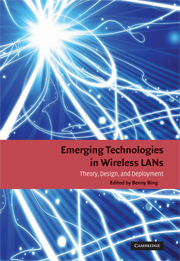Book contents
- Frontmatter
- Contents
- Authorship by Chapter
- Foreword
- Preface
- Part I Introduction to 802.11
- Part II 802.11 Quality of Service
- Chapter 3 WLAN QoS
- Chapter 4 Performance Understanding of IEEE 802.11 DCF and IEEE 802.11e EDCA
- Chapter 5 Cross-layer Optimized Video Streaming over Wireless Multi-hop Mesh Networks
- Part III 802.11 Security
- Part IV High Throughput 802.11
- Part V 802.11 Mesh Networks
- Part VI 802.11/Cellular Interworking
- Part VII Coexistence
- Part VIII 802.11 Network and Radio Resource Management
- Part IX 802.11 Range
- Part X 802.11 Hardware Design
- Part XI Wi-Fi Hotspots
- Part XII Wi-Fi Applications
- Part XIII Ultra WideBand (UWB)
- Part XIV Public Wireless Broadband
- Epilogue
- Index
Chapter 3 - WLAN QoS
from Part II - 802.11 Quality of Service
Published online by Cambridge University Press: 10 December 2009
- Frontmatter
- Contents
- Authorship by Chapter
- Foreword
- Preface
- Part I Introduction to 802.11
- Part II 802.11 Quality of Service
- Chapter 3 WLAN QoS
- Chapter 4 Performance Understanding of IEEE 802.11 DCF and IEEE 802.11e EDCA
- Chapter 5 Cross-layer Optimized Video Streaming over Wireless Multi-hop Mesh Networks
- Part III 802.11 Security
- Part IV High Throughput 802.11
- Part V 802.11 Mesh Networks
- Part VI 802.11/Cellular Interworking
- Part VII Coexistence
- Part VIII 802.11 Network and Radio Resource Management
- Part IX 802.11 Range
- Part X 802.11 Hardware Design
- Part XI Wi-Fi Hotspots
- Part XII Wi-Fi Applications
- Part XIII Ultra WideBand (UWB)
- Part XIV Public Wireless Broadband
- Epilogue
- Index
Summary
With both the enterprise and residential sectors embracing voice over IP (VoIP) at an accelerating pace, and the pervasive use of wireless local area networks (WLANs), the natural requirement emerged for a technology to support VoIP over WLANs without degradation of its quality of service (QoS). QoS requirements for WLANs are imposed also by video and multimedia applications tailored for use with WLANs. A QoS-focused MAC Layer standard, IEEE 802.11e, was developed to meet the QoS requirements of a range of applications. In addition to VoIP/ multimedia QoS, the new standard serves mission-critical functions by reducing latency across a WLAN. This chapter discusses the enhancements the new standard adds to WLAN technology with respect to QoS performance, channel use efficiency, and power management of battery-based wireless devices.
Introduction
Since the initial emergence of the 802.11 network interface card for laptop computers and access points, the appeal of 802.11 technology has been so strong worldwide that it is now appearing in a wide range of devices, including consumer electronics devices and VoIP phones. Enterprises wish to extend VoIP over wireless LANs for the convenience wireless service brings to the mobile user throughout the building, campus, quad and warehouse, as well as anywhere a WLAN is accessible. Residential users purchasing VoIP service for cost savings, look to the WLAN to enable them to make their telephones cordless. The installation of WLANs in public spaces, backed up by a ubiquitous Internet, makes the case of VoIP over WLANs even more compelling.
- Type
- Chapter
- Information
- Emerging Technologies in Wireless LANsTheory, Design, and Deployment, pp. 39 - 62Publisher: Cambridge University PressPrint publication year: 2007
- 1
- Cited by



